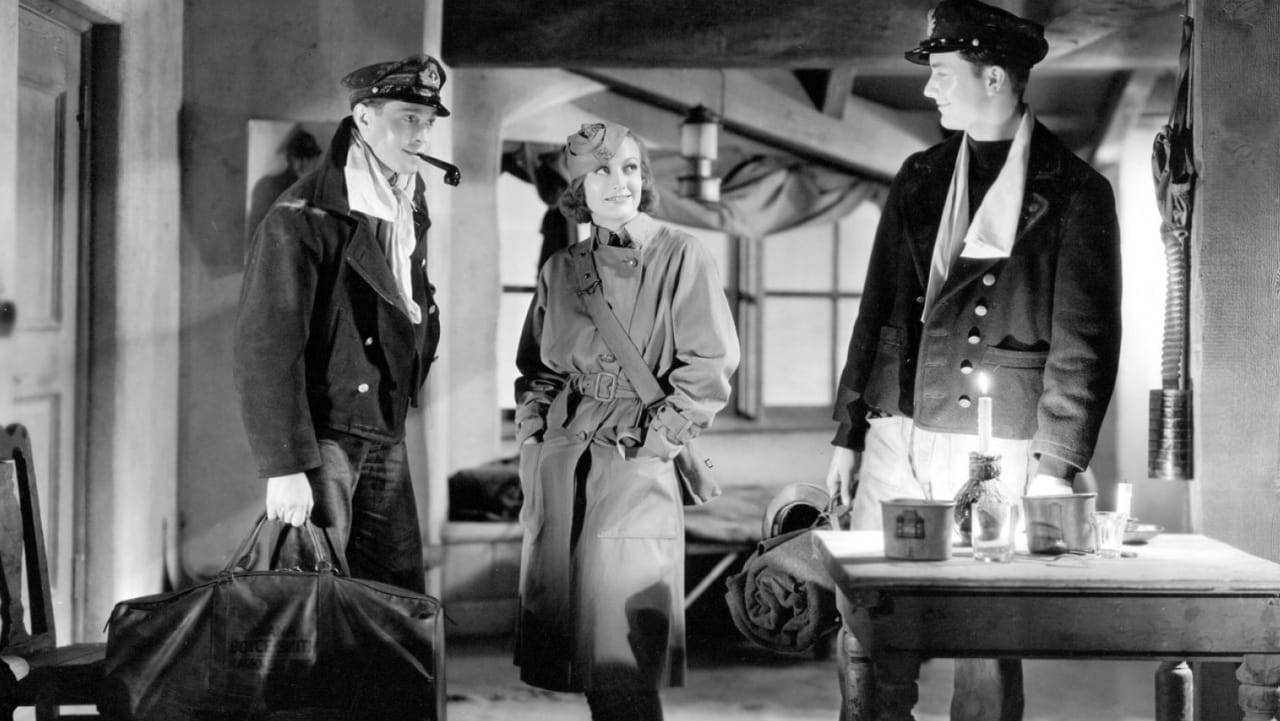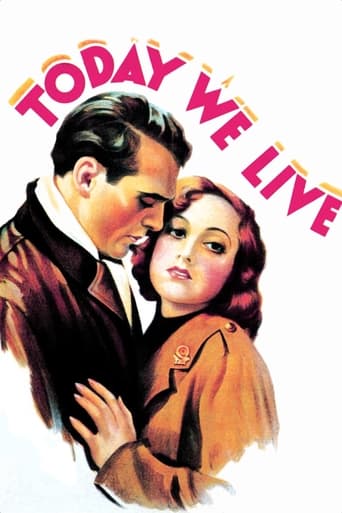

This love story set during WW I, is a pretty boring affair despite of the casting of a young Gary Cooper and a Beautiful Joan Crawford.There seems to be no Chemistry between the two leads.Robert Young as the third part of the triangle is perhaps a bit old for his role,but pulls it off quite well.The only real chemistry with Crawford has the actor playing her brother,Franchot Tone, he gives perhaps the best performance in the movie together with Cooper's sidekick Roscoe Karns. Crawford and Tone fell in love during the shooting of this movie and it shows quite clearly in their scenes together.The aviation scenes are what really saves this movie.They're excellently made considering the vintage of this film.Too bad the rest of the story is so boring.
... View MoreDespite some very glossy MGM B&W photography, as shown in the good print of this film aired by TCM, and some attractive sets and very Adrian-created costumes for JOAN CRAWFORD, TODAY WE LIVE is a film as generic as its title. It's hard to distinguish from any other triangle romance except that the war background gives it added interest.The script is a strange affair. It's hard to believe that JOAN CRAWFORD and GARY COOPER would openly declare their deep love for each other after exchanging a few glances across a cup of tea. In the very next scene they're hopelessly in love, with Crawford feeling guilt because she's the fiancé of ROBERT YOUNG.Young's brother is the carefree FRANCHOT TONE (who walks off with the earlier scenes in the film), while ROBERT YOUNG gets his chance to do a fair share of emoting later in the film as his role expands. It's nice seeing these well-known actors at an early stage in their budding careers and still in their prime.For GARY COOPER fans this is nothing special, but Crawford's admirers will find that she was at the height of her photogenic, sculptured beauty despite some odd dress designs by Adrian that don't suggest anything but the studio's line of glamor during the early '30s. She wears a boldly designed dress with a strange wing collar that has to be seen to be believed. It's hilarious! And that's just so she can pour tea with some dignity.The actors all speak in clipped lines. "Good girl," says Franchot Tone on several occasions, trying to sound like Colonel Blimp, I suppose. And the others too adopt a strange way of clipping phrases so they sound more British. Very funny.It goes into darker territory in the later war scenes and there director Howard Hawks seems more at home. But for a film in which the Joan Crawford character was added as a last minute script change, she certainly gets her fair share of footage and dominates the first forty-five minutes. But the love angle is certainly a strange one. She treats Cooper with rude indifference several times during their first meeting although his behavior is that of the perfect gentleman. Shortly thereafter, she confesses she's in love with him. That's the movies for you.
... View MoreA tolerable romance/war-actioner with the stars doing their best in a boring love story.The movie comes alive only in the war scenes.The interplay between the male stars works better than the romance bit.Roscoe Karns is impressive in supporting part as Cooper's war buddy
... View MoreIt's impossible to watch "Today We Live" without mentally recasting it. Franchot Tone and Robert Young as upper-crust Brits? In what alternate universe? No matter how many "I say's" Faulkner gives them, they just can't sublimate their American aura to their British characters. And Joan Crawford's teatime attire by Adrian, breathtaking as it is, is also uncomfortably out of place. (Crawford does manage to sound a little more authentic than Tone and Young.)However, if you can get past the accents and the costumes, there's good stuff here. Young plays the puppy-dog-like Claude to perfection; his turn in the airplane is hilarious. Tone pulls off the tough-big-brother act as well as the no-fuss stoicism of Ronnie. Gary Cooper and Crawford survive not only the world's most abbreviated courtship but also convey the hurt and betrayal that each one's character feels subsequently.In some ways, the film is even daring, portraying heroism without histrionics or flag-waving. And (SPOILER ALERT), despite what the IMDB plot summary says, my impression is that Ann and Claude shack up without benefit of vows, which would make this a very progressive tale indeed.Bottom line: Worth watching, especially if you're a fan of any of the four leads.
... View More